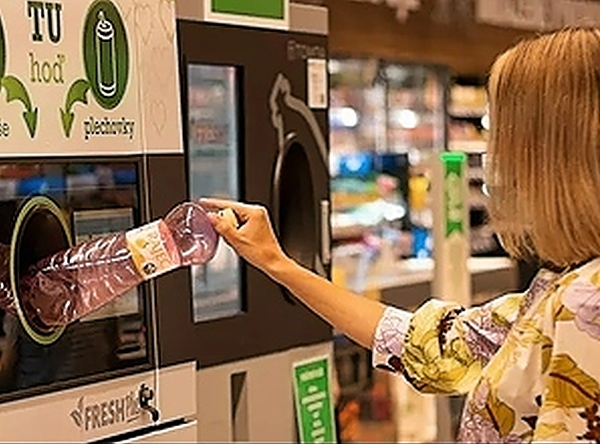POLAND
Long-awaited bill on deposit return system made public / Start-up planned for 2025 / Criticism from Plastics Europe Polska
The Polish government recently published a bill introducing a deposit return system (DRS) on beverage containers, covering single-use plastic bottles of up to 3 litres, reusable glass bottles of up to 1.5 litres and metal cans of up to 1 litre. The system is slated to become operational from 1 January 2025.
Tomra (Asker, Norway; www.tomra.com), a Norwegian company that provides automated solutions for the collection of metal, plastic, and glass beverage packaging for recycling, welcomed the bill, emphasising that “DRSs are proven to maximise resource efficiency and reduce litter polluting the environment”.
Tomra (Asker, Norway; www.tomra.com), a Norwegian company that provides automated solutions for the collection of metal, plastic, and glass beverage packaging for recycling, welcomed the bill, emphasising that “DRSs are proven to maximise resource efficiency and reduce litter polluting the environment”.
 Tomra's DRS machine in Slovakia (Photo: Tomra) |
Less than 50% of beverage containers in Poland are collected and recycled, said Anna Sapota, VP of public affairs for Eastern Europe North, Tomra. Assuming a 90% collection level on beverage packaging to be achieved thanks to the DRS, the company elaborates, Poland can recover more than 12 bn beverage containers for recycling every year. “Landfills are overflowing. This will change with the introduction of a deposit return system,” Sapota added.
Related: Hungary’s deposit return scheme set to start in 2024
The bill also faced some backlash. A DRS – helping to get good quality material for recycling – should not be implemented apart from an effective extended producer responsibility (EPR) scheme, Anna Kozera-Szałkowska, managing director at Plastics Europe Polska (www.plasticseurope.org/pl), told Plasteurope.com.
“Unfortunately, Polish legislators took a different approach. At the beginning of this year, work on the new EPR scheme project was officially suspended and the recently introduced law on DRS is fulfilling only the obligations coming from SUP Directive, implemented in Poland with a two-year delay,” Kozera-Szałkowska said.
The time given to the beverage industry to create and maintain a DRS is very short, which compels the biggest players in the beverage market to join forces to appoint the operator necessary to launch and operate such a system as soon as possible.
Related: Report on Plastpol fair trade, Polish plastics industry
Kozera-Szałkowska added that although in the public perception the DRS might be seen as key for enhancing plastics recycling quotas in Poland, it is essential to remember that it covers only a selected stream of plastics waste, representing some 3-5% of total plastics waste. “The real game changer would be the effective EPR scheme the whole value chain in Poland is waiting and struggling for.”
05.10.2023 Plasteurope.com [253636-0]
Published on 05.10.2023
